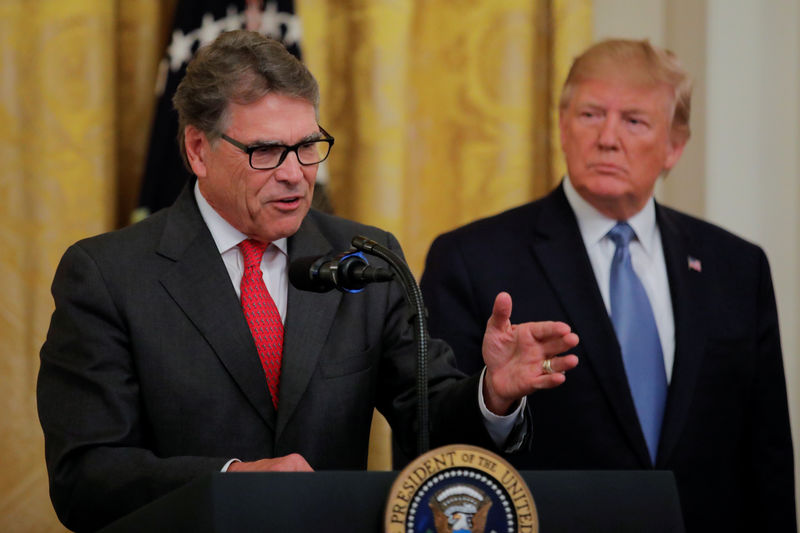By Mark Hosenball and Timothy Gardner
WASHINGTON (Reuters) - U.S. Energy Secretary Rick Perry, a member of President Donald Trump's Cabinet who has played a pivotal role in the Ukraine controversy, will refuse to testify as requested next week in the Democratic-led impeachment inquiry against Trump, an Energy Department spokeswoman said on Friday.
Perry's refusal represented the latest instance of Trump's administration refusing to cooperate in the fast-moving inquiry in the House of Representatives.
Trump said on Oct. 17 that Perry was resigning from his Cabinet post and would step down by the end of the year.
Perry, White House budget office acting director Russell Vought and two other officials were asked to testify on Wednesday next week in a closed session before the three House committees leading the inquiry, an official working on the probe said.
The inquiry focuses on a July 25 telephone call in which Trump asked Ukrainian President Volodymyr Zelenskiy to investigate political rival Joe Biden, a former U.S. vice president and a leading contender for the Democratic nomination to face him in the 2020 election, and his son Hunter, who had served as a director for a Ukrainian energy company.
Democrats have accused Trump of abusing his power and trying to pressure a vulnerable U.S. ally to interfere in an American election for his own political benefit.
State Department counselor Ulrich Brechbuhl and Under Secretary of State for Political Affairs David Hale also were asked to testify on Wednesday, according to the official working in the inquiry.
"The Secretary will not partake in a secret star chamber inquisition where agency counsel is forbidden to be present," spokeswoman Shaylyn Hynes said in a statement, referring to Perry.
"If the committee is interested in conducting a serious proceeding they are welcome to send for the Secretary's consideration an invitation to participate in an open hearing where the Department's counsel can be present and the American people can witness," Hynes said.
Perry's refusal to testify marked his latest act of defiance in the impeachment effort. The Energy Department said on Oct. 18 that Perry would not turn over documents subpoenaed by Democrats in the probe, arguing at the time that the impeachment inquiry had not been properly authorized.
In the first formal test of support for the impeachment investigation, the Democratic-controlled House on Thursday voted almost entirely along party lines - 232 to 196 - to move forward with the probe, including public hearings.
Perry was one of three officials - along with Gordon Sondland, a Trump donor who serves as U.S. ambassador to the European Union, and Kurt Volker, the former U.S. special representative for Ukraine - assigned to take the lead on American policy toward Ukraine after Trump abruptly removed the U.S. ambassador in Kiev, Marie Yovanovitch, in May.
Trump's personal lawyer, Rudy Giuliani, had urged Trump to remove Yovanovitch. Yovanovitch testified in the impeachment inquiry that Trump had ousted her based on "unfounded and false claims" after she had come under attack by Giuliani.
Giuliani has emerged as a central figure in the Ukraine controversy. He pushed for Ukraine to investigate the Bidens. Trump in May instructed senior U.S. officials to coordinate Ukraine policy with Giuliani.
Democrats are considering whether to consider articles of impeachment - formal charges - against Trump. If approved in the House, the Republican-led Senate would hold a trial on those charges and decide whether to convict Trump and remove him from office.
A series of current and former Trump administration officials have testified behind closed doors in the inquiry.
PUBLIC HEARINGS LOOMING
House Speaker Nancy Pelosi said on Friday she expects public hearings in the impeachment inquiry to begin this month.
"I would assume there would be public hearing in November," Pelosi, the top Democrat in Congress, said in an interview with Bloomberg.
Any case that is made to impeach the president, she added, "has to be ironclad."
U.S. District Judge Paul Oetken in Manhattan on Friday refused to release a Giuliani associate from house arrest while he awaits trial on charges of illegally funneling money to a pro-Trump election committee and other politicians.
Oetken said at a hearing that there was a risk the Belarus-born businessman, Igor Fruman, would flee the country. Fruman, who lives in Florida, did not appear in court.
Fruman was arrested on Oct. 9 at a Washington-area airport along with another Florida businessman, Ukraine-born Lev Parnas, carrying a one-way ticket to Vienna. He was released on bail, but ordered confined to his home and subject to electronic monitoring.
Federal prosecutors have accused Fruman and Parnas of using a shell company to donate $325,000 to the pro-Trump committee and of raising money for former U.S. Representative Pete Sessions of Texas as part of an effort to have the president remove Yovanovitch.

Giuliani has said Parnas and Fruman helped his efforts in Ukraine to investigate Biden and denies wrongdoing.